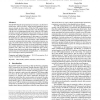Free Online Productivity Tools
i2Speak
i2Symbol
i2OCR
iTex2Img
iWeb2Print
iWeb2Shot
i2Type
iPdf2Split
iPdf2Merge
i2Bopomofo
i2Arabic
i2Style
i2Image
i2PDF
iLatex2Rtf
Sci2ools
PPOPP
2015
ACM
2015
ACM
MPI+Threads: runtime contention and remedies
Hybrid MPI+Threads programming has emerged as an alternative model to the “MPI everywhere” model to better handle the increasing core density in cluster nodes. While the MPI standard allows multithreaded concurrent communication, such flexibility comes with the cost of maintaining thread safety within the MPI implementation, typically implemented using critical sections. In contrast to previous works that studied the importance of critical-section granularity in MPI implementations, in this paper we investigate the implication of critical-section arbitration on communication performance. We first analyze the MPI runtime when multithreaded concurrent communication takes place on hierarchical memory systems. Our results indicate that the mutex-based approach that most MPI implementations use today can incur performance penalties due to unfair arbitration. We then present methods to mitigate these penalties with a first-come, first-served arbitration and a priority locking scheme...
| Added | 16 Apr 2016 |
| Updated | 16 Apr 2016 |
| Type | Journal |
| Year | 2015 |
| Where | PPOPP |
| Authors | Abdelhalim Amer, Huiwei Lu, Yanjie Wei, Pavan Balaji, Satoshi Matsuoka |
Comments (0)

